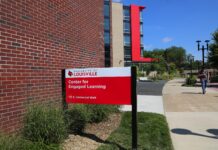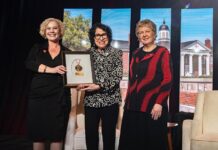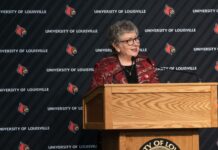LOUISVILLE, Ky. – The future of health sciences research in Louisville came closer today when the University of Louisville officially opened the Clinical and Translational Research (CTR) building at the corner of South Hancock and East Muhammad Ali Blvd. The nearly 300,000 square foot-building houses researchers exploring ways to prevent, treat and cure diseases that impact people throughout the world.
“This building not only is the gateway to the medical center, but it is the gateway for UofL’s talented faculty to conduct research that will help change the world,” said Dr. James Ramsey, president of UofL. “The building provides the research space necessary for us to continue to attract some of the very best researchers in the world to Louisville. These people are driving innovative cures to cancer and disease and will have a direct impact on the health and quality of life of people throughout the nation and the world.”
“Generous support from state and federal entities is critical to continuing our research efforts. The state, through the Bucks for Brains program, enables us to have the funding that helps these researchers establish their programs here when they arrive. Sen. Mitch McConnell was instrumental in obtaining a federal appropriation that helped us fund the construction of this magnificent facility.”
Ramsey also noted additional federal investments in the university that McConnell has assisted with. These include funding for the construction of the Cardiovascular Innovation Institute and the Baxter II research buildings on the UofL Health Sciences campus, and the Belknap Research Building on the main campus.
“Research taking place in the CTR has the potential to dramatically impact the lives of people not only in Kentucky, but throughout the nation and world,” McConnell said. “The investment we are making into the University of Louisville now will pay dividends for generations to come.”
The CTR cost approximately $143.1 million including a project to extend the service tunnel and took more than two years to construct. It is the largest construction project to be completed in Louisville this year. Utilizing a modeling system designed to estimate economic impact of projects, UofL estimates CTR construction alone has had an impact of approximately $242.7 million. This includes approximately 1,795 direct construction jobs and an additional 1,030 spinoff jobs for the metropolitan economy. And this is just one of many projects the university has developed in recent history at the health sciences center.
“CTR is part of the health sciences center’s master plan to create the physical and intellectual capital necessary to be the centerpiece for our premiere metropolitan research university,” said Dr. Larry Cook, executive vice president for health affairs at UofL. “Over the past decade we have seen unequalled growth in our biomedical research funding from the National Institutes of Health. As we continue to grow in this arena, our creation of new knowledge can be advanced by other entities, which can lead to more economic development for the city. And most importantly, will lead to better health for the people in the Commonwealth and beyond.”
One of the significant features about CTR is the conscious effort in the design and construction of the building related to sustainability issues. UofL has applied for LEED certification at the Silver level because of these efforts. Some examples include:

























